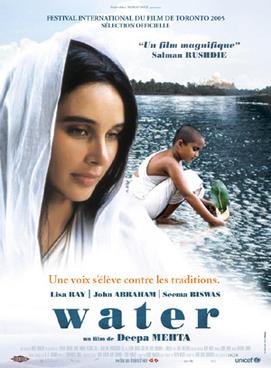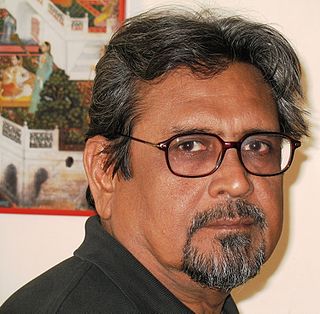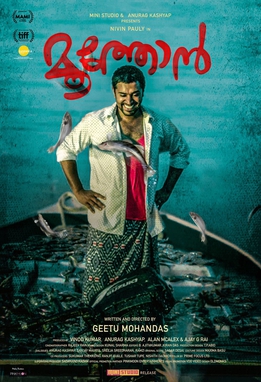
Deepa Mehta, is an Indian-born Canadian film director and screenwriter, best known for her Elements Trilogy, Fire (1996), Earth (1998), and Water (2005).

Maqbool Fida Husain was an Indian artist known for executing bold, vibrantly coloured narrative paintings in a modified Cubist style. He was one of the most celebrated and internationally recognised Indian artists of the 20th century. He was one of the founding members of Bombay Progressive Artists' Group. M.F. Husain is associated with Indian modernism in the 1940s. His early association with the Bombay Progressive Artists' Group used modern technique, and was inspired by the "new" India after the partition of 1947. His narrative paintings, executed in a modified Cubist style, can be caustic and funny as well as serious and sombre. His themes—sometimes treated in series—include topics as diverse as Gandhi, Mother Teresa, the Ramayana, the Mahabharata, the British Raj, and motifs of Indian urban and rural life. In September 2020, his painting titled “Voices”, auctioned for a record $2.5 million.

Sooni Taraporevala is an Indian screenwriter, photographer, and filmmaker who is the screenwriter of Mississippi Masala, The Namesake and Oscar-nominated Salaam Bombay!, all directed by Mira Nair. She also adapted Rohinton Mistry's novel Such A Long Journey and wrote the films Dr. Babasaheb Ambedkar, her directorial debut Little Zizou, and Yeh Ballet, a Netflix original film that she wrote and directed.

Salaam Bombay! is a 1988 Indian Hindi-language drama film, directed, co-written and co-produced by Mira Nair. The screenwriter was Nair's creative collaborator Sooni Taraporevala. This was the first feature film directed by Nair. The film depicts the daily lives of children living in slums in Bombay, India's largest city. It stars Shafiq Syed, Raghuvir Yadav, Anita Kanwar, Nana Patekar, Hansa Vithal and Chanda Sharma.

Lisa Rani Ray is a Canadian actress. She began her modelling career in India in the early 1990s, appearing for leading Indian brands like Bombay Dyeing and Lakmé. She made her acting debut in 1994 in the film Hanste Khelte. Through her acting career, Ray has demonstrated a penchant for issue-oriented portrayals, most notably in the 2005 Oscar-nominated Canadian film Water and the award-winning South African feature The World Unseen, described by a reviewer as "one of the best-conceived queer films of the past year."

Anand Patwardhan is an Indian documentary filmmaker known for his socio-political, human rights-oriented films. Some of his films explore the rise of religious fundamentalism, sectarianism and casteism in India, while others investigate nuclear nationalism and unsustainable development. Notable films include Bombay: Our City (1985), In Memory of Friends (1990), In the Name of God (1992), Father, Son, and Holy War (1995), A Narmada Diary (1995), War and Peace (2002) and Jai Bhim Comrade (2011), and Reason (2018) which have won national and international awards.

Water is a 2005 drama film written and directed by Deepa Mehta, with screenplay by Anurag Kashyap. It is set in 1938 and explores the lives of widows at an ashram in Varanasi, India. The film is also the third and final installment of Mehta's Elements trilogy. It was preceded by Fire (1996) and Earth (1998). Author Bapsi Sidhwa wrote the 2006 novel based upon the film, Water: A Novel, published by Milkweed Press. Sidhwa's earlier novel, Cracking India was the basis for Earth, the second film in the trilogy.

Dev Benegal is an Indian filmmaker and screenwriter, most known for his debut film English, August (1994), which won the Best Feature Film in English at the 42nd National Film Awards.

Jahanara Kajjan, or "Miss Kajjan", was an Indian singer and actress active during the 1920s and 1930s, often referred to as the "Nightingale of Bengal". The reigning queen of early talkie movies glamorous movie sensation the trained classical singer, the fashion icon and the trendsetter, Jahanara Kajjan she was known as "Lark of Hindi Cinema" and the "Beautiful Nightingale of Bengal Screen". She along with Master Nissar made most sought after and popular singing pair of the stage and film.

Vanaja is a 2006 Telugu-language drama film written and directed by Rajnesh Domalpalli on a story that constituted his Master of Fine Arts thesis at Columbia University. The film was made on a shoestring budget using a cast of non-professional first-timers for two and a half months.
Samir Mallal is a Canadian filmmaker whose work touches commercials, virtual reality, and documentaries. Samir is based in Los Angeles, California.

Anurag Kashyap is an Indian filmmaker and actor known for his works in Hindi cinema. He is the recipient of several accolades, including four Filmfare Awards. For his contributions to film, the Government of France awarded him the Ordre des Arts et des Lettres in 2013.

Piyush Jha is a film director, screenwriter, author and series creator from India.
The KASHISH Pride Film Festival is an annual LGBTQ event that has been held in Mumbai, India, since 2010. The film festival screens gay, lesbian, bisexual, transgender and queer films from India and around the world. It is voted as one of the top five LGBT film festivals in the world.

Leena Manimekalai is an Indian filmmaker, poet and an actor. Her works include five published poetry anthologies and several films in genres, documentary, fiction and experimental poem films. She has been recognised with participation, mentions and best film awards in many international and national film festivals.

Amrit Gangar is an Indian film scholar, historian, critic, curator and writer from Mumbai, Maharashtra, India.

Moothon, also known internationally as The Elder One, is a 2019 Indian Malayalam-language action thriller film written and directed by Geetu Mohandas, and jointly produced by S. Vinod Kumar, Anurag Kashyap, Ajay G. Rai and Alan McAlex. Featuring a bilingual narrative in Jeseri dialect of Malayalam and Hindi, the film stars Nivin Pauly, Shashank Arora, Sobhita Dhulipala, Melissa Raju Thomas, Sanjana Dipu and Roshan Mathew. Hindi-language dialogues were written by Anurag Kashyap. The film premiered at the 2019 Toronto International Film Festival and received a positive critical response. It was included in The Hindu's top 25 Malayalam films of the decade and is widely regarded as one of the defining movies of the New Wave Movement.

Teenaa Kaur Pasricha is an independent filmmaker and screenwriter. Her most acclaimed documentary film "1984, When the Sun Didn't Rise" is based on the lives of the women who survived the massacre of 1984

Sangita Iyer is an Indian-born Canadian author, broadcast journalist, writer, biologist and documentary filmmaker. She is known for her advocacy on wildlife conservation, especially for wild elephants, and for exposing the atrocities against Asian elephants by religious institutions. Iyer has been featured in the BBC News. She is the founding executive director and president of the Voice for Asian Elephants Society, which was created in 2016 with the aim of protecting wild and captive elephants of India.

















